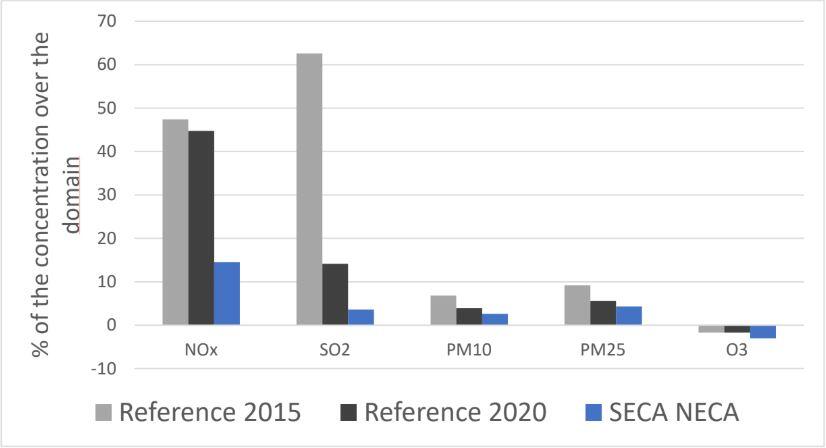Air pollution from ship traffic in the Mediterranean Sea can significantly be reduced due to the introduction of an Emission Control Area (ECA), a new report launched yesterday found. France which is behind the impact assessment investigated potential air quality improvements in the region following a switch to better grade marine fuels as well as related socio-economic benefits especially in terms of reduced health costs and environmental damage. Inter alia the report highlights that particulate matter can be reduced by up to 20% and nitrogen dioxide (NO2) levels even by up to 76%, all of this leading to up to 14 billion Euros in reduced health costs and more than 6,000 lives that can be saved every year.
Charlotte Lepitre, health policy officer at FNE: “The study shows the need for a Mediterranean emission control area. The French environmental ministry must now take its role as a leader and search for support in as much Mediterranean countries as possible.”
Beate Klünder, transport policy officer at NABU: “We see that a combined sulphur and nitrogen emission control area will have the greatest effect for the people living in the coastal areas. If governments cooperate well such a regulation could come into effect as early as 2022. Now that there is clear evidence for significant socio-economic benefits there is no excuse to further postpone an implementation. Any delay let people suffer longer than necessary and that is not acceptable at all.”
Started in 2017 by the Cerema, CITEPA and INERIS, the French study was awaited by all Mediterranean countries. It gives economic, health and environmental cost-benefits obtainable by the installation of an ECA in the Mediterranean Sea. The report shows the extent of emission reduction for different air pollutants on a country by country level and even includes more detailed analysis for several coastal cities. It also points out the cost and the health and environmental gains (estimated in euro).
The key finding is that the regions would benefit most from a combined SECA and NECA. SO2 would be reduced by 77 % and in port areas even by 100 %. NO2 would decline by up to 76% in coastal areas and the East of the Mediterranean Sea. The annual mean of PM2.5 will go down by 15 to 20%. About 6,000 premature deaths will be avoided due to the reduction of the particle pollution.
The declaration of the Mediterranean Sea as an ECA would bring 8 to 14 billion Euro savings of health costs per year and would cost about 1,67 billion Euro.
Shipping air pollution can represent up to 40 % of Mediterranean costal city air pollution. It represents a significant threat for human health, environment and climate. The main reason of this pollution is the use of a heavy fuel oil, highly charged in sulphur that emits black carbon, heavy metals, fine particulates (primary and secondary), and sulphur dioxide. Furthermore, as pollutants are carried over long distances, it is not only the inhabitants of littoral zones but also the population in the hinterland who are subject to respiratory issues as well as inflammations, cardio vascular diseases.
Shipping emissions causes 50,000 premature deaths per year and cost 60 billion Euros only in health costs per year in the EU.
Source: FNE (France Nature Environment)
Source: https://www.hellenicshippingnews.com/an-emission-control-area-in-the-mediterranean-sea-will-bring-enormous-air-quality-benefits-french-study-shows/











